
Related
Guests
- President Obamaaddressing the COP15.
After ten days of talks, uncertainty looms over the Copenhagen summit — and, some might say, the fate of the planet. Negotiations remain deadlocked as fundamental divisions remain between rich and poor countries. A draft agreement drawn up by a small group of countries, including the US, was dismissed overnight by developing nations. President Obama arrived early this morning to join nearly 120 other world leaders at the summit. In a much anticipated address, Obama offered no new proposals to address the demands of developing countries. [includes rush transcript]
Transcript
AMY GOODMAN: This is Climate Countdown.
PRESIDENT MOHAMED NASHEED: I invite the leaders of big developing countries to recognize their responsibilities. I urge them to come forward at Copenhagen with quantifiable and verifiable actions.
HILLARY CLINTON: The United States is prepared to work with other countries toward a goal of jointly mobilizing $100 billion a year by 2020 to address the climate change needs of developing countries.
JADE LINDGAARD: These targets do not allow to stay below two degree rise in temperature. And they even say that it could lead us to a rise of three degree in temperature, which is, as we know, catastrophic.
NAOMI KLEIN: It’s a horrible choice that the United States has put before the world: accept a completely unacceptable agreement that will not solve the climate crisis, or receive no money to deal with the effects of that crisis, which you are already living — the droughts, the floods, the malaria.
PRESIDENT EVO MORALES: [translated] And if the leaders of countries cannot arrive in an agreement, why don’t the peoples then decide together?
AMY GOODMAN: It’s Climate Countdown. This is Democracy Now!, democracynow.org. I’m Amy Goodman. We’re broadcasting live from inside the Bella Center here in Copenhagen.
Today is scheduled to be the final day of the UN climate summit. After ten days of negotiations, uncertainty looms over the fate of the talks — and, some might say, the fate of the planet. Negotiations remain deadlocked as fundamental divisions remain between rich and poor countries. A draft agreement drawn up by a small group of countries, including the US, Britain and Australia, has been dismissed overnight by developing nations.
Meanwhile, President Barack Obama arrived in Copenhagen early this morning to join nearly 120 other world leaders at the summit. He delivered his much-anticipated address to the plenary just before this broadcast.
PRESIDENT BARACK OBAMA: We will all be stronger, all be safer, all be more secure, if we act together. That’s why it is in our mutual interest to achieve a global accord in which we agree to certain steps and to hold each other accountable to certain commitments.
After months of talk, after two weeks of negotiations, after innumerable side meetings, bilateral meetings, endless hours of discussion among negotiators, I believe that the pieces of that accord should now be clear.
First, all major economies must put forward decisive national actions that will reduce their emissions and begin to turn the corner on climate change. I’m pleased that many of us have already done so. Almost all the major economies have put forward legitimate targets, significant targets, ambitious targets. And I’m confident that America will fulfill the commitments that we have made: cutting our emissions in the range of 17 percent by 2020 and by more than 80 percent by 2050 in line with final legislation.
Second, we must have a mechanism to review whether we are keeping our commitments and exchange this information in a transparent manner. These measures need not be intrusive or infringe upon sovereignty. They must, however, ensure that an accord is credible and that we’re living up to our mutual obligations. Without such accountability, any agreement would be empty words on a page. I don’t know how you have an international agreement where we all are not sharing information and ensuring that we are meeting our commitments. That doesn’t make sense. It would be a hollow victory.
Number three, we must have financing that helps developing countries adapt, particularly the least developed and most vulnerable countries to climate change. America will be a part of a fast-start funding that will ramp up to $10 billion by 2012. And yesterday, Secretary Hillary Clinton, my Secretary of State, made it clear that we will engage in a global effort to mobilize $100 billion in financing by 2020, if — and only if — it is part of a broader accord that I’ve just described: mitigation, transparency, financing. It’s a clear formula, one that embraces the principle of common but differentiated responses and respective capabilities. And it adds up to a significant accord, one that takes us farther than we have ever gone before as an international community.
I just want to say to this plenary session that we are running short on time. And at this point, the question is whether we will move forward together or split apart, whether we prefer posturing to action. I’m sure that many consider this an imperfect framework that I just described. No country will get everything that it wants. There are those developing countries that want aid with no strings attached and no obligations with respect to transparency. They think that the most advanced nations should pay a higher price — I understand that. There are those advanced nations who think that developing countries either cannot absorb this assistance, or that will not be held accountable effectively, and that the world’s fastest-growing emitters should bear a greater share of the burden.
We know the fault lines, because we’ve been imprisoned by them for years. These international discussions have essentially taken place now for almost two decades, and we have very little to show for it other than an increased acceleration of the climate change phenomenon. The time for talk is over.
This is the bottom line: we can embrace this accord, take a substantial step forward, continue to refine it, and build upon its foundation. We can do that, and everyone who is in this room will be part of a historic endeavor, one that makes life better for our children and our grandchildren, or we can choose delay, falling back into the same divisions that have stood in the way of action for years. And we will be back having the same stale arguments, month after month, year after year, perhaps decade after decade, all while the danger of climate change grows until it is irreversible.
Ladies and gentlemen, there is no time to waste. America has made our choice. We have charted our course. We have made our commitments. We will do what we say. Now I believe it’s the time for the nations and the people of the world to come together behind a common purpose. We are ready to get this done today, but there has to be movement on all sides to recognize that it is better for us to act than to talk. It’s better for us to choose action over inaction, the future over the past. And with courage and faith, I believe that we can meet our responsibilities to our people and the future of our planet. Thank you very much.
AMY GOODMAN: President Obama addressing the UN climate change summit here in Copenhagen.

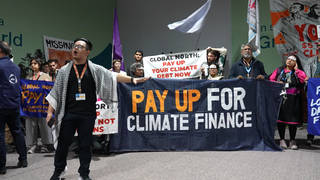
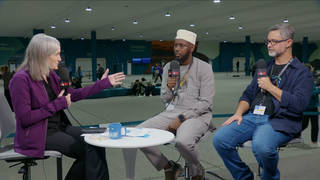
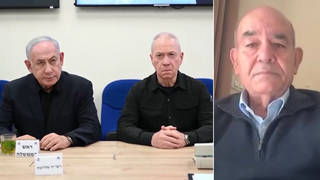
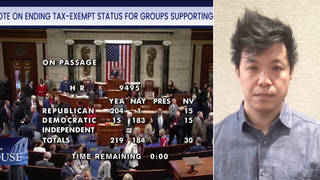





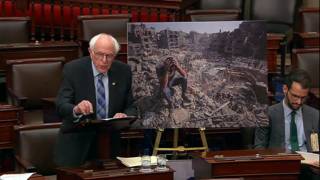
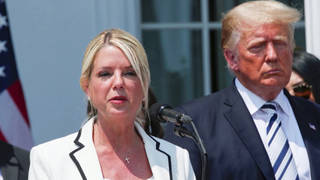
Media Options